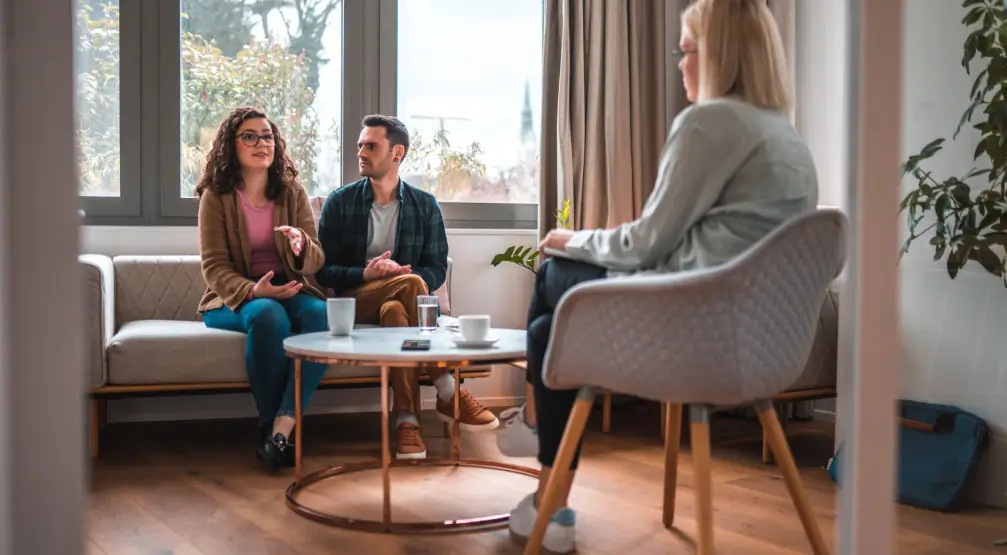Relationships often bear the brunt of stress, anxiety, and life’s challenges. Romantic partnerships, though built on love and trust, can sometimes struggle under the weight of unresolved conflicts, communication breakdowns, and mental health concerns. This is where couple therapy, particularly through supportive therapy and anxiety counseling, plays a transformative role in not only healing relationships but also fostering individual mental well-being.
The Importance of Couple Therapy for Mental Health
Couple therapy is not just about fixing conflicts; it is about building resilience, understanding, and emotional support within a relationship. Mental health concerns, such as anxiety and depression, often impact both partners, even if only one person is directly experiencing symptoms. The interconnected nature of relationships means that when one partner struggles, the other may feel overwhelmed, helpless, or even distant. By engaging in therapy together, couples create a safe space to express their emotions, understand each other’s experiences, and strengthen their emotional connection.
Understanding Supportive Therapy in a Relationship Context
Supportive therapy is a crucial aspect of couple therapy. It involves creating a therapeutic environment where couples can openly discuss their fears, anxieties, and struggles without judgment. Unlike traditional problem-solving approaches that focus solely on behavioral changes, supportive therapy emphasizes emotional validation, encouragement, and reassurance. This method helps couples develop a deep sense of empathy and solidarity, which is essential for overcoming mental health challenges together.
Benefits of Supportive Therapy for Couples:
- Emotional Validation – Partners learn to acknowledge and validate each other’s feelings, reducing misunderstandings and fostering trust.
- Stress Reduction – Sharing anxieties and concerns in a safe environment alleviates stress and prevents emotional suppression.
- Improved Communication – Couples develop healthier ways of expressing their needs, fears, and expectations.
- Greater Intimacy – A deeper emotional connection leads to enhanced physical and emotional intimacy.
- Conflict Resolution – Partners become better equipped to handle disagreements constructively, rather than engaging in destructive patterns.
Anxiety Counseling: A Crucial Element in Relationship Healing
Anxiety is one of the most common mental health challenges that affect relationships. Whether it stems from past trauma, personal insecurities, or external stressors, anxiety can create distance between partners. Symptoms such as excessive worry, irritability, or emotional withdrawal can strain a relationship, leading to frustration and disconnection.
Anxiety counseling within couple therapy helps couples navigate these challenges in a supportive manner. It provides tools and strategies for managing anxious thoughts while strengthening the relationship as a secure base. Some approaches used in anxiety counseling for couples include:
- Cognitive Behavioral Therapy (CBT): Helps couples identify and reframe negative thought patterns that contribute to anxiety and relationship distress.
- Mindfulness-Based Therapy: Encourages couples to stay present, reducing overthinking and promoting relaxation.
- Attachment-Based Therapy: Focuses on understanding how past experiences shape attachment styles, fostering a more secure and trusting relationship.
- Relaxation Techniques: Breathing exercises, meditation, and guided imagery help couples cope with stress more effectively.
By addressing anxiety within the relationship, couples can reduce misunderstandings, foster patience, and create a healthier dynamic where both partners feel emotionally supported.
The Role of a Therapist in Couple Therapy
A skilled therapist serves as a neutral guide, facilitating meaningful conversations and helping couples break negative cycles. In supportive therapy, the therapist encourages open expression of emotions, validates concerns, and provides constructive feedback. When anxiety is a central concern, the therapist may introduce specific strategies to help both partners recognize and manage triggers. The therapist’s role is to:
- Create a Safe Space – Ensuring both partners feel heard and understood without judgment.
- Identify Core Issues – Helping couples recognize patterns that contribute to stress and conflict.
- Offer Effective Tools – Introducing techniques for communication, stress management, and emotional connection.
- Encourage Personal Growth – Guiding each partner toward self-awareness and personal development.
- Reinforce Relationship Strengths – Highlighting positive aspects of the relationship to build confidence in its future.
When Should Couples Consider Therapy?
Many people believe that therapy is only for couples on the verge of separation or divorce. However, therapy is beneficial at any stage of a relationship. Seeking therapy proactively can prevent minor issues from escalating into major conflicts. Some signs that indicate the need for therapy include:
- Frequent misunderstandings and miscommunications
- Persistent stress and anxiety affecting the relationship
- Lack of emotional intimacy and connection
- Struggles with trust, jealousy, or insecurity
- Unresolved past traumas impacting the present relationship
- Recurring arguments over the same issues
- Feeling unheard or unsupported in the relationship
If any of these resonate, couple therapy can provide the necessary support to rebuild and strengthen the relationship.
How to Get the Most Out of Couple Therapy
For therapy to be effective, both partners must be committed to the process. Here are some key ways to maximize its benefits:
- Be Open-Minded: Enter therapy with a willingness to understand and grow.
- Practice Active Listening: Truly hear what your partner is expressing without interrupting or becoming defensive.
- Implement Therapy Techniques: Apply the skills learned in sessions to daily interactions.
- Be Patient: Healing and growth take time; progress may not be immediate but is always valuable.
- Seek Individual Therapy if Needed: Sometimes, personal issues require individual therapy alongside couple therapy to ensure comprehensive healing.
Conclusion: A Stronger Bond Through Therapy
Couple therapy is not a sign of failure; it is a proactive step toward building a healthier, more resilient relationship. Supportive therapy fosters emotional security, while anxiety counseling helps navigate mental health challenges with compassion. By seeking therapy together, couples can transform struggles into opportunities for growth, ultimately deepening their bond and enhancing their overall well-being.
If you and your partner are facing difficulties, consider couple therapy as a powerful tool for healing and connection. The journey may not always be easy, but with mutual effort and professional guidance, it can lead to a fulfilling and lasting relationship.


